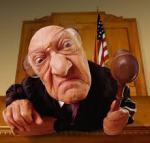Concerns about privacy are growing in our high-tech age, when governments and businesses are able to know ever more about you. We’ve recently learned of pervasive governmental data collection covering, like, all our phone calls and online communications. Privacy advocates are aghast, yet are you actually harmed if the government has a record of your phone talk with Aunt Sally? (Well, you may be harmed as a taxpayer by the cost of this excess.)

Then there’s your DNA.
Alonzo King was arrested in 2009 for pointing a shotgun at people. The process included a cheek swab DNA sample. It matched one from an unsolved 2003 rape. Alonzo King got life without parole.
Maryland’s highest court overturned the rape conviction, declaring the swab an “unreasonable search.” But the U.S. Supreme Court disagreed, the other day.

The words “fishing expedition” have such negative legal connotations that legitimate anglers ought to demand use of a different metaphor. But let’s remember what’s really at issue here. It’s the Fourth Amendment’s protection against “unreasonable searches and seizures.”

So, considering all this, the test I’d apply in a case like King’s is whether the procedure in question can be abused to railroad an innocent person. The answer here would seem to be no. DNA swabbing should catch only guilty people and no innocents.*

Maybe the real lesson here is that if you’ve committed rape, then don’t get arrested for some minor thing so your DNA will be taken. (Similarly, don’t drive with a broken tail-light if you’ve just blown up the Alfred P. Murrah Federal Building.) We’re lucky criminals tend not to be the most prudent souls. But if they’re going to be both criminal and stupid, let them suffer the consequences; the Bill of Rights was not enacted to ensure a different result.
But seriously, whatever right Alonzo King might arguably claim for DNA privacy, under the Fourth Amendment’s “unreasonable searches and seizures” clause, is overwhelmed by society’s far more compelling interest in deterring and punishing rape. If modern technology, like DNA identification, gives law enforcement newly improved capabilities for nailing perps, that’s no bad thing, and if we have to give up a tiny bit of privacy in exchange for this, it’s a small price to pay for the benefit we all get from reduced crime. We might, in a limited sense, be less free; but freedom from crime and the fear of crime are important freedoms too.

But meantime we have a much bigger “unreasonable searches and seizures” problem than Alonzo King’s, when confiscations by police, under the pretext of the drug war, have become an out-of-control racket. Like when they tried to seize the motel owned by an elderly Massachusetts couple on the grounds that drug dealers had supposedly rented rooms. (Read this.) In such cases the rights and interests of the individuals clearly overwhelm the (altogether dubious) societal interests being asserted. I’m still waiting for the Supreme Court to issue a ringing denunciation of such blatant governmental violations of the Fourth Amendment.
* This assumes the DNA identification is scientifically on the up-and-up, which admittedly could be an issue. But a different issue. For present purposes it should be assumed that a DNA match is a match.
